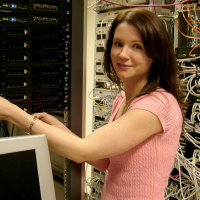Fran Berman Wins Ken Kennedy Award
Originally Printed in the Winter/Spring 2010 Newsletter
The IEEE Computer Society and the Association for Computing Machinery jointly present the inaugural Ken Kennedy Award to Dr. Francine Berman for her leadership in building national-scale cyberinfrastructure, the environment that supports rapidly expanding computing and information services over networked resources, including the Internet.
Fran, vice president for research at Rensselaer Polytechnic Institute, is a pioneer in grid computing, a structure that lets companies or universities link many computa-tional and other resources over a network to solve current health, environment and social problems. She formally received the 2009 Kennedy Award at the SC09 Conference in November in Portland, Oregon. She was cited for “her influential leadership in the design, development, and deployment of national-scale cyberinfrastructure,” the aggregation of computers, data, networks, instruments, and individuals to address the 21st century’s greatest challenges in science and society. She is a leading advocate for the development of a national-scale cyberinfrastructure for the access, use, stewardship, and preservation of the digital data that forms the foundation of the Information Age. Her work has had a major impact on the direction of computational science and the cyberinfrastructure that supports it.
Fran was named one of the 10 top women in Technology by Business Week in 2004, and one of the 15 national leaders in Science and Technology by Newsweek in 2006. In 2008, she was named a “Digital Preservation Pioneer” by the Library of Congress for her leadership and a vision that is “both grand and rooted in reality”. She has promoted computing as an enabling force for science and engineering and is a pioneer in the area of application-focused grid computing. She was also cited for her inspiring work as a teacher and mentor, and her service to the high-performance computing community. Fran is co-chair of the Blue Ribbon Task Force on Sustainable Digital Preservation and Access, an international group focusing on economic sustainability of the digital information that must be accessed and preserved for decades to come. She has served on key advisory boards for the National Science Foundation, the National Academies, the National Institutes of Health and other groups, and was one of the two founding Principal Investigators of the National Science Foundation’s $53 million TeraGrid Project.
In 2001, she became director of both the San Diego Super-computer Center (SDSC) and the National Partnership for Advanced Computational Infrastructure (NPACI), a consortium of over 40 national and international partners, whose mission was to advance science by creating a comprehensive national computational infrastructure. Under her leadership, NPACI developed a national-scale grid and created an integrated package of software supporting large-scale domain applications, providing critical initial experience with technical organizational policy and applications for national-scale cyberinfrastructure.
Committed to ensuring that the science and technology draw from the best and the brightest in the largest possible pool, Fran is recognized as an outstanding role model and advocate for women to be part of the mainstream science and technology world. She was a founding member and a co-chair of CRA-W as well as the founding editor of the “Expanding the Pipeline” column in Computing Research News. She currently serves on the Anita Borg Institute for Women and Technology Board of Trustees.
Before her appointment at Rensselaer, Fran held the High Performance Computing Endowed Chair in the Jacobs School of Engineering at the University of California at San Diego, and served as San Diego Supercomputer Center direc-tor. In 2000, she was named an ACM Fellow for pioneering work in application scheduling for parallel distributed computing. Berman received a B.A. in mathematics from the University of California, Los Angeles, and a M.A. and Ph.D. degrees in Mathematics from the University of Washington.
ACM and the Computer Society co-sponsor the Kennedy Award, which was established in 2009 to recognize substantial contributions to programmability and productivity in computing and significant community service or mentoring contributions. It was named for Ken Kennedy, the founder of Rice University’s nationally ranked computer science program, who was one of the world’s foremost experts on high-performance computing. It carries a $5,000 honorarium endowed by the ACM Special Interest Group on Computer Architecture (SIGARCH) and the Computer Society.






